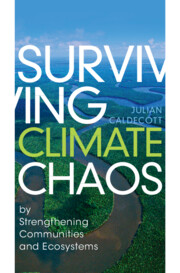Book contents
- Surviving Climate Chaos
- Surviving Climate Chaos
- Copyright page
- Dedication
- Contents
- Preface
- Acknowledgements
- Part I Context, Tools and Systems
- Part II Understanding Climate Chaos
- Part III Practical System Strengthening
- Part IV Global Perspectives
- 9 Changing Ideas of Adaptation
- 10 Learning from the Adaptation Communications
- 11 Adaptation in Specific Geographies
- Part V Conclusions
- Abbreviations and Acronyms
- References
- Index
10 - Learning from the Adaptation Communications
from Part IV - Global Perspectives
Published online by Cambridge University Press: 02 September 2021
- Surviving Climate Chaos
- Surviving Climate Chaos
- Copyright page
- Dedication
- Contents
- Preface
- Acknowledgements
- Part I Context, Tools and Systems
- Part II Understanding Climate Chaos
- Part III Practical System Strengthening
- Part IV Global Perspectives
- 9 Changing Ideas of Adaptation
- 10 Learning from the Adaptation Communications
- 11 Adaptation in Specific Geographies
- Part V Conclusions
- Abbreviations and Acronyms
- References
- Index
Summary
The first-generation Nationally Determined Contributions (NDCs) and other adaptation communications after the Paris Agreement are a huge knowledge resource. They report diverse and detailed insights on how governments and their advisers think about vulnerabilities, trends and future hazards, and their priorities and coping strategies. From them it is clear that community-based and ecosystem-based adaptation approaches are widely recognised as effective, and as sources of diverse co-benefits. These apply especially at the local and landscape level of national societies, and comparing earlier and later communications reveals that this awareness is increasing. This matches the idea that local action to promote resource tenure and management capacity, plus help with mapping, planning and networking with other communities, is key to strengthening local systems against climate chaos. That local people are capable of rising to this challenge is evident from many government accounts, and from the case studies here. These directions of travel will become clearer as second-generation NDCs become available in the lead-up to the global stocktake in 2023.
Keywords
- Type
- Chapter
- Information
- Surviving Climate Chaosby Strengthening Communities and Ecosystems, pp. 207 - 245Publisher: Cambridge University PressPrint publication year: 2021

